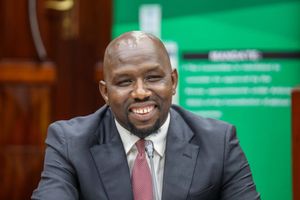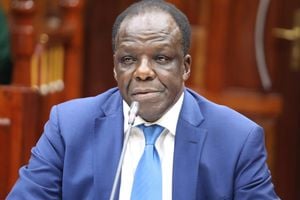
Former Tourism and Wildlife Cabinet Secretary Najib Balala.
The withdrawal of Sh8.5 billion graft charges against former Tourism CS Najib Balala and 16 others sparked an unfriendly fight between the office of the Director of Public Prosecutions and the Ethics and Anti-Corruption Commission (EACC).
Malindi Chief Magistrate James Mwaniki allowed the withdrawal of the charges despite opposition by the EACC, with the anti-graft body maintaining that the evidence presented to the DPP was sufficient to sustain the charges.
Mr Balala was accused in connection to irregular payment by the Tourism Fund for consultancy services for the proposed Ronald Ngara Utalii College in Vipingo, Kilifi County.
The matter was investigated by the EACCand the file forwarded to the DPP Renson Ingonga, who gave consent for the suspects to be charged on December 19, 2023.
Mr Balala and his co-accused were presented in a Malindi court on December 22 and others on December 28, 2023, and they denied the charges before they were freed on bond.
On July 31, the matter came up for pre-trial to confirm whether the prosecution was ready to proceed with the case and for purposes of taking the hearing dates.
However, the prosecutor made an application to withdraw the case under section 87a of the Criminal Procedure Code, to allow for more investigation to be done by the EACC.
EACC said it was surprised by the move as Mr Ingonga gave the consent to charge the accused persons after agreeing with the anti-graft body that the evidence gathered, was enough to sustain the charges.
An investigator Mr Mohamed Boru said in an affidavit that the evidence was sufficient and the case was watertight and wished for the matter to proceed to full trial.
The ODPP directed the discontinuation of the case pursuant to Article 157 of the constitution and section 87(a) of the CPC.
According to the DPP, the investigations were not complete and full disclosure made and the period that the investigations might take was uncertain.
In the ruling, the court noted that whereas the DPP has the power to discontinue a case, it must be done with the permission of the court.
The magistrate said the withdrawal must be made in public interest, interest in the administration of justice and the need to prevent and avoid abuse of the court process.
The court said that although the withdrawal of the charges cannot be said to amount to an abuse of court process, it was not right for the DPP to arraign suspects only to withdraw the charges afterwards.
“There is need to have finality on any legal process otherwise the ODPP will be undertaking what I call round-about or circuit proceedings,” Mr Mwaniki said.
The EACC has previously proposed to be given prosecutorial powers, with the chairperson Bishop David Oginde stating that it will help fast-track the process and help save resources involved.
Previous court decisions have stated that the DPP has the last say in the prosecution of graft cases.
Further, the DPP cannot be questioned or challenged on the merits or sufficiency of the evidence at the pre-trial stage, until a full hearing of the case and cross-examination duly carried out, when the court can determine whether there is a case to answer or not.
In a judgment in July 2020, Justice George Odunga, then a judge of the High Court held that no public prosecution may be undertaken without the consent of the DPP.
The judge stated that Article 157(10) of the Constitution provides that the DPP shall not require the consent of any person or authority for the commencement of criminal proceedings and in the exercise of his or her powers or functions, shall not be under the direction or control of any person or authority.







